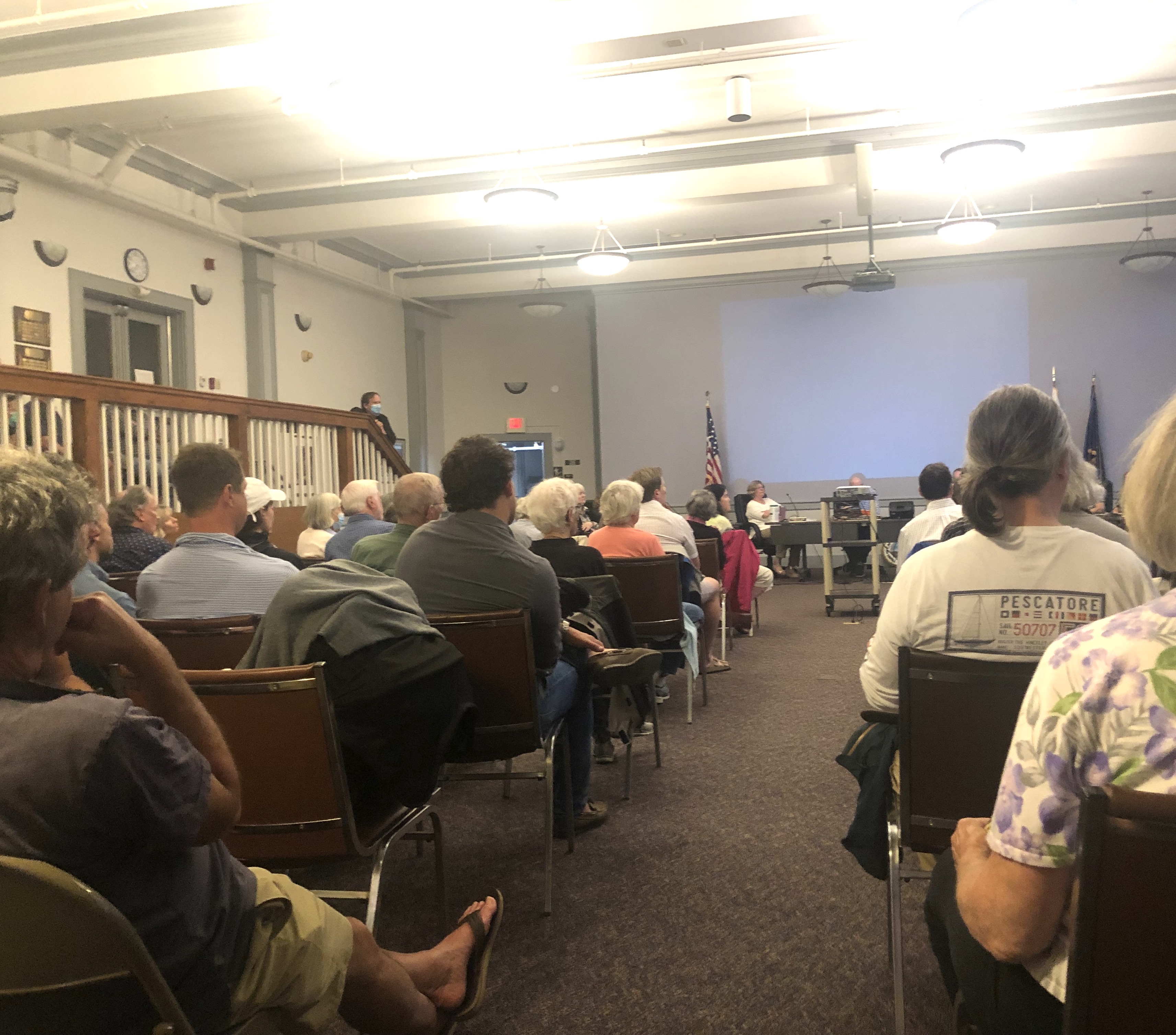Published on June 24, 2021

Returning to the council chambers for the first time since March 2021, the Tuesday, June 22, 2021 Town Council workshop on Town Center Affordable Housing Amendments welcomed a packed house of community members eager to voice their opinions, concerns, and questions regarding the proposed ordinance amendments. Chair Jamie Garvin noted that the workshop would be conducted in a manner different from normal to allow citizens ample time to speak and ask questions directed not only to the Town Council, but to the guests invited to the workshop. The guests, considered experts in fields related to affordable and multi-family housing, included Jeff Levine of Levine Planning Strategies and Eric Jorgensen of Maine State Housing Authority. Levine provided context on the impediments multifamily developments face in the current regional market as presented in a 2021 study requested by the Greater Portland Council of Government's Metro Regional Coalition. Jorgensen offered information on Maine Housing Authority's guidelines for financing affordable housing developments throughout the state as well as a review of Cape Elizabeth's 2020 rental housing affordability index.
Based on the local median income, "workforce housing" is housing that is 60 to 120 percent of the area median income. Housing which is 80 percent of the median income is considered "affordable" and is considered "low income" when it falls below 60 percent. According to this index, Jorgensen stated that 60 percent of the median income in Cape Elizabeth is $42,000 for an individual and $59,000 for a family of three; 80 percent of the median income for a single person is $55,950 and $71,950 for a family of three. Maine Housing Authority defines affordability as family that does not pay more then 30 percent of income on rent. According to their statistics, in order to rent in Cape Elizabeth one needs to have a household income of $92,000 to afford a median 2-bedroom apartment. To purchase a median 2-bedroom home requires a household income of $174,000. These figures, Jorgensen suggested, implies that the typical member of the workforce will likely not be able to live in Cape Elizabeth without affordable housing options. State-wide, Maine Housing Authority estimates that 25 thousand more units of affordable housing are required to meet the need of Mainers through single family homes and apartments. Given the rise in housing prices, limited housing stock, and cost of construction, Jorgensen believes that, "the solution for this part of the state is going to have to be skewed towards multifamily housing."
At the request of Town Manager Matt Sturgis, Jorgensen provided information on how neighboring cities are responding to the housing problem beyond the most common response of issuing tax-credits. Portland is looking at city-owned land, issuing RFPs, and providing incentives to help with acquisition of housing. Sanford is looking to rehabilitate tax-acquired properties to be resold at affordable rates using revolving loans and grants. Biddeford is looking to encourage owner-occupancy of small multi-unit properties of four units or fewer by offering rehabilitation grants in exchange for affordability covenants. Other towns, like Kennebunkport, are looking at developments in conjunction with community land trusts to offset the cost of land acquisition by building an affordable subdivision. Kennebunkport Heritage Trust is building five homes with a target sales price of $220 - $245 thousand. York, like other towns, is making an effort to increase density by allowing more accessory dwelling units. However, Jorgensen said, "It's fair to say that of all these approaches the most bang for the buck does come from projects that have multi-unit apartments; they provide a meaningful increase and move the needle on the actual availability of affordable units in the region."
Some of the questions that came from citizens attending the meeting were about other alternatives such as rent-to-own options and allowing smaller homes on in-fill lots. One citizen commented that the workshop was not focusing on the correct issue by only talking about affordable housing, suggesting that widespread support for diverse, inclusive, and affordable housing already exists. Rather, the citizen suggested that the crux of the issue has to do with the town green and what the "front door of the town should look like for the next one hundred years," and that if the project were to be moved further from the town center that there would be greater support. Garvin responded that the property in consideration is privately owned and there are no other options currently being considered which are located further from the town center, and that the catalyst for the workshop is the council's task to consider the request of four zoning amendments pertaining to affordable housing.
Another resident asked each Town Councilor to define what constitutes a "substantial public benefit," referring to one of the council's parameters for the Town Center Affordable Housing Amendments. Councilor Gretchen Noonan said that, "Affordable housing is inherently a substantial public benefit," but that she has not determined if this particular project is worthy of making the amendments. Councilor Penny Joran answered by saying that the development would create, "Economic and income diversity; (a way for) older people to be able to stay here; and a vibrant town center. These are some of the benefits and there will be trade-offs that are hard, but we need to weigh in on the project's public benefit in the whole scheme of the equation." Garvin said that one of the ways he deems the project as offering a a substantial public benefit is that it addresses challenges and opportunities around diversity and town vitality as mentioned in the Executive Summary of the 2019 Comprehensive Plan.
Elizabeth Goodspeed, a resident and former committee member of the 2019 Comprehensive Plan, shared that while the proposed project addresses affordable housing goals as included in Recommendation #83 of the plan, "Goals 3, 4, 7, and 22 have been completely disregarded, which have more to do with the zoning ordinances that have been spoken about. Over half of the Comprehensive Planning Committee does not agree with this project or the zoning changes." In response to Garvin asking how she gathered input from members of the committee, Goodspeed answered that there would be a letter in the upcoming Cape Courier.
One resident suggested that the Town Council should, "Insist on a design where scale, mass, and density is consistent with the guidelines that the town has already established. We can have a solid outcome with affordable housing in Cape Elizabeth, but we just need to have patience to get it right." Similarly, a resident of Sea View Avenue commenting on the year-long collaborative effort between his neighborhood committee, the Conservation Committee, and the Town Council to create a solution regarding parking issues, suggested that a similar collaborative and slower approach be utilized to avoid, "Division and polarization."
One resident speaking in favor of the project, sited the need for more rental options for young couples wanting to move to town; an increase in town vibrancy; and an increase in the housing market as some residents might choose to downsize. Another speaker, who grew up in Cape Elizabeth, spoke of his frustration over not being able to be return to the town because of the lack of affordable housing options. David Jacobson, resident and owner of the property on which the development is proposed, spoke of his initial resistance to the project because it did not include commercial space on the first floor, "I had a vision of having my own Cheers after work." However, after doing some, "Digging, soul-searching, and looked into Nathan's company (The Szanton Company) and saw other (affordable housing) properties that he has developed in Portland, Biddeford, and upstate, they are all exceptional properties; he runs them well. It is going to be a safe place for affordable housing. I really don't see a more ideal place for affordable housing. I see this as a social issue. We have the opportunity to do something to create more equity in our communities whether it's economic diversity, racial diversity; this is what is in front of us. We can do something more than putting up a sign in our front yard. The ordinance changes would be for affordable housing only."
Another resident urged the council to consider the need for affordable housing beyond Cape Elizabeth's aging population, by focusing on creating ethnic diversity, "Are we creating some sort of structural barrier for people of color who cannot afford to live here? Are we helping only the people who grew up here and were born here? What are we doing as a town to encourage ethnic diversity?" Jordan responded by saying the project is, "Open to everybody. I believe we do need to create affordable opportunities for families of varying ethnic backgrounds. I believe that strongly. As we have said, this isn't the only solution that we should consider from an affordable-housing perspective. This is just one type of solution."
Kristin Martin, who works with developer, responded that she has extensive knowledge of who lives in these apartments given her past experience managing buildings owned and operated by The Szanton Company, "It is a huge mixture of people: a mixture of single elderly people living in a one-bedroom; elderly couples; young couples; single parents in a one-bedroom; single-parents in a two-bedroom; a mixture of ethnicities which reflect the communities the buildings they are located in. All of these places are full and all of these places have huge waitlists trying to get into these buildings." In addition, Garvin added that it would be, "Irresponsible to disregard the elderly population in Cape Elizabeth -- which has the oldest population in a state with the oldest population."
The last resident who spoke, pushed back on the notion that there has not been community participation thus far; "I am speaking in favor of this. We elect Town Councilors to make tough decisions. Citizens have opportunities to serve on committees, the Planning Board, and every other committee in town. So to say that there isn't citizen participation in this decision is a wrong approach. Housing is a huge problem in this town and I think that our ordinances do everything they can to not solve the problem."
The first 55 minutes of the workshop were not recorded due to technical difficulties. The remaining portion of the three-hour meeting and all materials can be accessed here.

